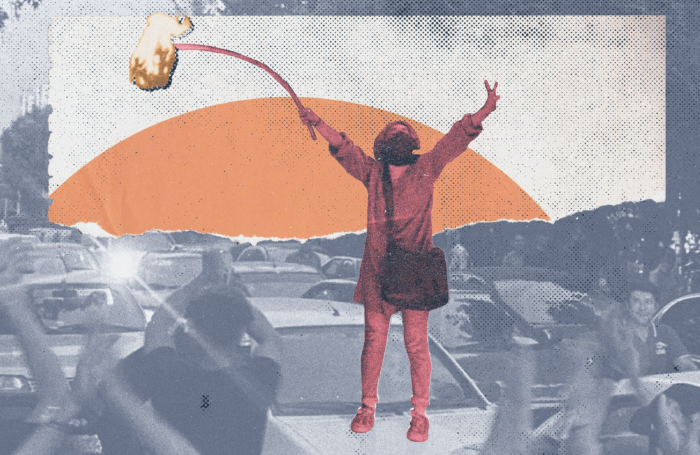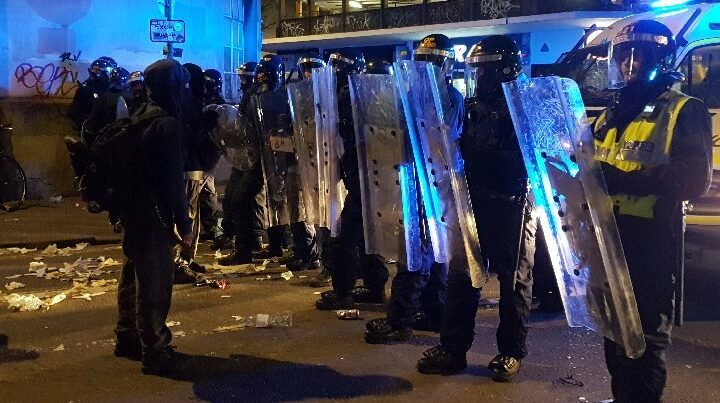From: http://npolicemonitor.co.uk/uncategorized/blog-post-sex-worker-rights-and-abolition/
Molly Smith (organiser with sex worker group SWARM, co-author (with Juno Mac) of ‘Revolting Prostitutes: the fight for sex workers’ rights)
Sex worker rights organising is an education in abolition. People sell sex because they need money, for many marginalised people it is a strategy of survival. Any attempt to ‘reduce’ prostitution through policing will inevitably fail in its stated goal because it does not address the actual reasons that sex work exists. The policing and criminalisation of prostitution misdirects attention away from the structural problems of our society – such as capitalism and poverty – onto pathologised, stigmatised and criminalised ‘others’ such as ‘the prostitute’, ‘the john’, and ‘the dealer’.
Not only does policing prostitution ‘miss the point’ of why people sell sex: policing actively creates harm. In England, Scotland and Wales, street sex workers and their clients can both be arrested and prosecuted, and sex workers who work indoors from shared flats face criminalisation for brothel-keeping. This pushes sex workers into foregoing safety strategies such as working on the street in groups and in well-lit areas, or working indoors with a friend. Criminalisation thus creates a vicious circle of harm: it sends a message to society that sex workers are bad and dirty, at the same time as materially obstructing the ways that sex workers might try to stay safe – rendering sex workers intensely vulnerable to violent people. State violence and interpersonal violence go hand in hand: the sex workers most vulnerable to arrest, prosecution or deportation are also those most vulnerable to physical violence and exploitation from individuals. That is because criminalisation and policing, far from making people safer, creates the conditions in which interpersonal violence and harm can flourish.
The policing of prostitution in the UK uses immigration law to particularly target migrant sex workers. For example, in 2017 police raided a flat in Swindon where three Romanian women were working. The police arrested the women, took their money, and deported them. They framed this as for the women’s safety, telling the local paper: “the women are now safe and away from their clients and are no longer vulnerable to the risks of off-street sex work”. A few months later, police in Smethwick raided a flat where three Romanian women were working, and had the women evicted and then deported. In Leeds in 2013, the police prosecuted three Polish women who had escaped an exploitative manager and were working in what the judge acknowledged was an ‘informal co-operative’. They were convicted. In 2018, hundreds of police officers raided London’s Chinatown parlours in what was portrayed in the press as an anti-trafficking operation. As a result of the raid, multiple women were charged with immigration offences, and many were taken to Yarl’s Wood and then deported. The police also stole £37,000 out of individual women’s lockers.
Despite this, it is common for women’s organisations to work with the police, and for the anti-prostitution feminist movement to uncritically laud them. Anti-prostitution campaigners routinely celebrate raids like those described above, and campaigns sometimes share resources on ‘how to spot a brothel’ – with obvious implications for the sex workers who will be caught up in a raid. The manager of a women’s service, based in Glasgow, even told a reporter: “We don’t wait until [prostitutes] say they want to exit and we share all our info with police … We try everything to engage with them. That could be a [criminal] charge, which puts them in a system where they have support.”
It is deeply ironic that this strand of the feminist movement has attempted to co-opt the term ‘abolition’. They want to connect their attempts to ‘abolish’ the sex trade through criminalisation to the abolition of slavery. Analogising modern prostitution to chattel slavery underplays the horror of centuries of slavery in the Americas to the extent that it seems to border on genocide denial. And in both the US and the UK, policing and prisons are directly descended from slavery and colonialism (in 2012, then-prime minister David Cameron responded to calls for reparations by offering to give money to Jamaica to build a new prison, on the understanding that it would be used to incarcerate ‘foreign criminals’ deported from the UK), while the criminalisation of prostitution disproportionately targets black sex workers and other sex workers of colour. In Norway – which is one of the countries held up by anti-prostitution feminists as their ideal – Amnesty International found that police routinely stop black women they suspect to be sex workers, and criminalise, evict and deport them. It should be impossible to claim any proximity to the word abolition while advocating for more criminalisation.
The decriminalisation of prostitution is an abolitionist demand. It would take power and resources away from the police. Those resources could be invested in things that actually help people – like housing, healthcare, and childcare. Criminalisation is deeply implicated in creating the conditions where violence against sex workers thrives. We can change those conditions by dismantling the power of the police.
This article was initially published in the NPMP Magazine Issue 2. You can read all the articles and the full magazine here. To order your physical copy please email npolicemonitor@gmail.com.




